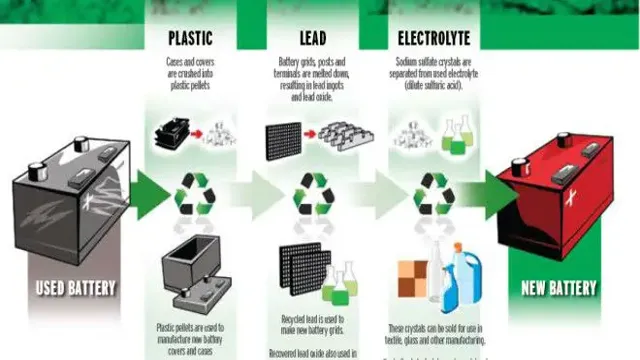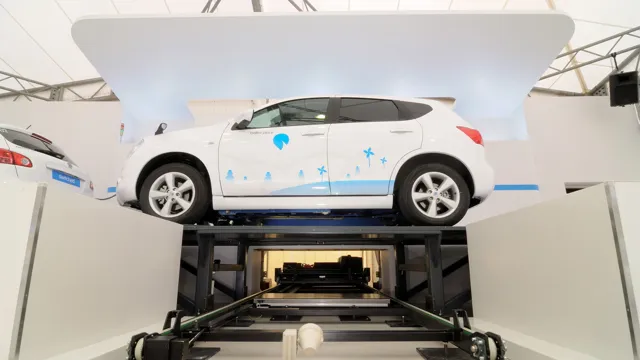Shocking Truths Revealed: Electric Car Battery Fire Hazard Explained
Electric cars have taken the automotive industry by storm, boasting eco-friendliness, fuel efficiency, and quiet operation. Thanks to advancements in technology, these cars can travel longer distances on a single charge while maintaining high performance. However, with this cutting-edge tech comes a serious concern that has been raised recently.
Electric car batteries are at risk of catching fire, which raises concerns about safety. While these incidents might not be common, it is essential to understand the hazards related to electric car batteries. So, what exactly causes these batteries to combust, and what can be done to prevent it? In this blog, we explore the dangers of electric car batteries and the work that has gone into mitigating these risks.
The Reality of Battery Fires
Electric cars are all the rage these days, but many people are concerned about the potential fire hazard of their batteries. While it’s true that lithium-ion batteries used in these vehicles have been known to catch fire, the risk of this happening is actually quite low. In fact, electric cars are still safer than traditional gas-powered vehicles in terms of fire risk.
The reality is that any vehicle can catch fire, and when it comes to electric cars, proper safety protocols are in place to detect and prevent battery fires. It’s important to keep in mind that the vast majority of electric car owners will never experience a battery fire, and even those that do will likely be able to safely evacuate the vehicle without harm. Overall, the potential fire hazard of electric car batteries should not deter anyone from considering the many benefits of owning an electric vehicle.
Statistics on Battery Fires in Electric Cars
Battery fires in electric cars are a concern for many when it comes to the safety of electric vehicles. However, the reality is that battery fires in electric cars are rare. According to the National Highway Traffic Safety Administration (NHTSA), the rate of fires per vehicle for conventional gasoline-powered cars is higher than for electric vehicles.
In fact, electric cars have a lower rate of fires per vehicle than gasoline cars. While battery fires in electric cars have occurred, they are typically a result of high-speed impacts or mechanical failure rather than a defect in the battery itself. Additionally, advancements in battery technology and safety features have made electric vehicles safer than ever before.
So while the fear of battery fires in electric cars is understandable, the statistics show that the reality is quite different.

Causes of Electric Car Battery Fires
Electric car battery fires have been a controversial topic in the automobile industry for quite some time. The reality is that all batteries have the potential to catch fire, not only electric car batteries. The main causes of electric car battery fires are often linked to overcharging or overheating of the battery pack or cell, short circuits, mechanical damage, or even manufacturing defects.
Lithium-ion batteries – the most common type of battery used in electric cars – have a high energy density, meaning they can store and release a lot of energy in a short amount of time, which can cause them to heat up quickly. However, it’s worth noting that the chances of an electric car battery catching fire are still considerably lower than those of a gasoline-powered car catching fire in a crash. Electric car manufacturers have invested a lot of effort and resources in developing safer battery technologies, and fires in electric cars are becoming increasingly rare as safety measures continue to improve.
Preventing Battery Fires
Electric car battery fires have been a major concern for many people as the popularity of electric vehicles continues to grow. One way to prevent battery fires is by properly handling and storing the battery. For example, leaving the battery exposed to high temperatures and direct sunlight can lead to thermal runaway, which could cause a fire.
It’s also essential to ensure that the battery is not damaged in any way, such as punctures or cracks, as this can also increase the risk of fire. Additionally, it’s crucial to ensure that batteries are appropriately stored and charged to avoid overcharging and other potential hazards. By taking these preventative measures, we can reduce the risk of electric car battery fires and make electric vehicles a safe and sustainable option for transportation.
Safety Features in Electric Car Batteries
Electric car batteries are becoming increasingly popular due to their low environmental impact and their ability to travel long distances without refuelling. However, safety concerns remain a top priority for consumers. One of the most pressing concerns is the risk of battery fires.
To prevent this, electric car manufacturers have implemented various safety features in their batteries. For instance, some have installed a cooling system that regulates the temperature of the battery pack, preventing it from overheating and catching fire. Other manufacturers have incorporated sensors and software that can detect potential problems before they escalate into fire hazards.
In case of any detected anomalies, the battery management system can isolate the affected module or cell, reducing the risk of explosion. Additionally, the use of non-flammable electrolytes in some lithium-ion batteries has improved their safety levels. Thanks to these safety features, electric car drivers can have peace of mind while enjoying their clean and efficient means of transportation.
Maintenance Tips for Electric Car Batteries
As electric cars continue to gain popularity, it is important to ensure that their batteries are properly maintained to prevent potential dangers such as battery fires. One key factor in preventing battery fires is to avoid extreme temperatures that can cause the battery to malfunction or explode. It is best to avoid leaving your electric car in direct sunlight or a hot environment for an extended period of time.
Additionally, it is important to monitor the battery’s charge level and avoid charging it to 100% capacity if possible. Overcharging can cause the battery to overheat and potentially catch fire. By taking these measures and ensuring proper maintenance of your electric car’s battery, you can help prevent dangerous battery fires and ensure the longevity of your vehicle.
What to Do in Case of a Battery Fire
Preventing battery fires is crucial in ensuring safety. There are several steps that you can take to minimize the risk of a battery fire. Firstly, always ensure that you use the correct charger for your device and follow the manufacturer’s instructions.
Overcharging a battery can lead to overheating and potentially cause a fire. Secondly, avoid exposing your device to extreme temperatures or direct sunlight for long periods. Heat can increase the chances of a battery explosion or fire.
Additionally, avoid puncturing or damaging your device, as this can damage the battery and increase the risk of a fire. Finally, always store your device in a well-ventilated area, away from flammable objects. Prevention is always better than curing.
By following these simple steps, you can ensure that you never have to deal with a battery fire. So, stay safe by being cautious with your devices.
Future Developments in Battery Technology
Electric car batteries have come a long way in recent years, but the risk of fire and overheating still exists. Fortunately, future developments in battery technology promise to make these hazards a thing of the past. One approach being explored is the use of solid-state batteries, which replace the liquid or gel electrolytes found in current batteries with a solid-state material.
This not only reduces the risk of fire, but also improves performance, with solid-state batteries potentially offering longer driving ranges and faster charging times. Another approach is the use of a new class of electrolyte materials, called ionic liquids, which have the potential to increase battery safety and durability. As these and other innovations continue to emerge, the future of electric cars looks brighter than ever.
However, it is important to remember that even with these advancements, proper maintenance and care of electric car batteries is still crucial to ensure optimal performance and safety.
Advancements in Battery Safety
Battery technology has made tremendous strides over the years, and one area where great progress is being made is in battery safety. Advancements in battery safety are being driven by the increasing demand for high-performance batteries that can withstand extreme conditions. Future developments in battery technology will involve the use of materials that are less likely to catch fire or explode, making them much safer to use.
One promising development is the use of solid-state batteries, which use a solid electrolyte instead of a liquid one, making them less susceptible to leakage and overheating. Other innovations include the use of fire-retardant materials in battery packs and the development of sophisticated battery management systems that monitor the temperature and voltage of the battery to prevent overcharging and overheating. As consumers continue to demand more from their batteries, the industry will continue to invest in research and development to make batteries that are not only powerful but also safe to use.
New Battery Technologies that Could Reduce Fire Risk
In recent years, there has been a growing concern regarding the fire risk associated with lithium-ion batteries. However, these concerns could be alleviated with the development of new battery technologies. One of these technologies involves the use of solid-state batteries, which replace the flammable liquid electrolyte found in traditional lithium-ion batteries with a solid material.
This not only reduces the risk of fire, but also increases the battery’s energy density and lifespan. Another technology that shows promise is the use of lithium-sulfur batteries, which have a higher energy density than lithium-ion batteries and are also less of a fire risk. Additionally, researchers are exploring the use of fire-retardant electrolytes that are less likely to ignite or propagate a fire.
As these technologies continue to develop, we may see a future where the risk of battery fires is greatly reduced, opening up new possibilities for the use of batteries in a wide range of applications.
Conclusion: The Importance of Battery Safety
In conclusion, while electric cars offer numerous benefits, it is important to recognize the potential hazard of battery fires. These incidents serve as a reminder that innovations in technology always come with risks, and it is up to us to ensure that we are taking appropriate safety measures. Until we develop more advanced battery technologies, we may have to accept that there will always be a slight risk associated with driving an electric vehicle.
But hey, at least we’re not blowing up gas stations anymore, right?”
FAQs
What makes electric car batteries a fire hazard?
Electric car batteries can catch fire due to short circuits, overheating, manufacturing defects, or external damage. They contain flammable chemicals that can ignite and cause a fire.
How can electric car battery fire risks be minimized?
Electric car manufacturers must ensure quality control in battery production and install safety mechanisms that prevent overheating, short circuits, and punctures. Car owners must also follow safety guidelines, such as avoiding charging in extreme temperatures and parking in well-ventilated areas.
Are electric car battery fires more dangerous than gasoline car fires?
Electric car battery fires can release toxic fumes and gases, which may pose health risks to individuals in close proximity. While gasoline car fires can be equally hazardous, they can generally be extinguished more easily.
How is the electric car industry addressing battery fire risks?
The electric car industry is investing in advanced battery technologies that can improve battery performance and safety. Companies are also developing improved sensor technology that can detect and prevent battery fires in real-time. Additionally, regulatory bodies are enforcing safety standards and guidelines for electric car manufacturers.






